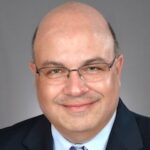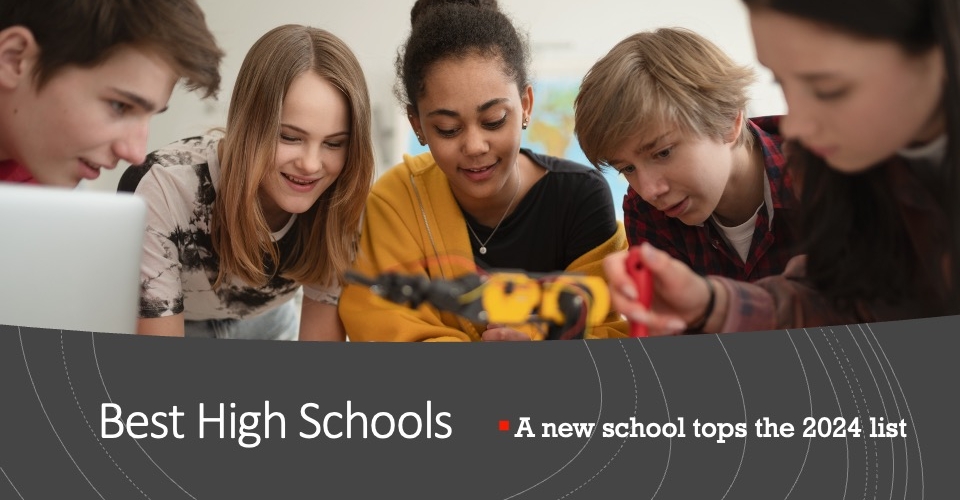Staying connected with networks of other district leaders is key to Superintendent Joseph Macary’s leadership philosophy at Vernon Public Schools in Connecticut. He calls collaborating with and learning from other superintendents are the “lifeblood” of his work in education.

“On one side you’ve got your board of education and your community at large and on the other side you have teachers, administrators and students, and you’re in the balancing act; you have to put everybody together,” says Macary, Connecticut’s 2024 superintendent of the year. “It’s hard to talk to people about what you do—other than the people who already do it.”
Macary has been superintendent of Vernon Public Schools and its 3,500 students since 2015, before which he was the superintendent of Wolcott Public Schools, also in Connecticut. During his career, he has also served as a social studies teacher and department chair, an athletic director and an assistant superintendent.
Macary recently chatted virtually with District Administration to talk about his district’s biggest achievements, opportunities to improve students’ well-being and celebrating success.
DA: How do you know your district is doing the right work?
Macary: “Vernon in the last four years has gotten two nationally recognized Blue Ribbon schools. To get a Blue Ribbon school is like the Olympic gold medal. It’s the most important thing you can get. They weren’t just for high achievement—they were for closing the achievement gap, which is the most important thing you want to do.
“We were at 40% of kids reading on grade level and now that’s up to 52%. We were at 27% for math and now we’re up to 44%. Do I want it to be 100%? Yes. Do I tell the staff that? Yes. But we are making a difference in the lives of kids.”
What are some of the ways you are closing achievement gaps?
“Our teachers are doing a fantastic job as are the students and parents who are supporting us. We have quality core instruction in Tier 1. We make sure our instruction is aligned to standards, and that it’s rigorous and cognitively engaging for students.
“If a student is not meeting grade-level expectations—that’s not through one test but multiple tests—we put them in Tier 2 supports in mathematics or language arts. A certified reading teacher is working with them to help them get into grade-level expectations, and that happens daily. If they’re not making progress, we give them additional support through special education in Tier 3. It’s that individualized support that makes it happen.”
How are you preparing students for life after high school?
“The biggest thing we’re doing is we are moving to a carer pathways model at Rockwell High School, where students are allowed to choose one of three academies, and, within each academy, they can choose a career pathway that will include an externship, postsecondary experiences and articulated courses.
“Last year, 65% of the graduating class at Rockwell High had college credit. Between tuition and scholarships, the class of 2022 had $2 million of college credit or scholarships—that’s a huge return on investment, and that’s how you’re going to get those kids to go to college.
“We’re also preparing students in advanced manufacturing, we’re preparing students in certified nursing assistant programs. We’re trying to make all these connections because we don’t want every student to go to college but we want every student to have a postsecondary experience, which could be military, two-year college, four-year college or a certification program to be successful in life.”
How are you recognizing these achievements?
“Too many times we’re looking at what’s next. We are finally taking a breather and reflecting on what has happened in the past. We’re celebrating all these successes. We did Blue Ribbon Week. It’s good sometimes to stop and say, ‘Hey, great job, you’re moving the needle and making a difference in the lives of children.’
“Moving forward, the work is never done. We trying to move forward into the instructional core and talking more about what are the instructional tasks we’re putting before kids. Are they aligned with standards? Are they cognitively engaging? Are they rigorous? Everybody will know where we’re going and what we’re trying to do.”
What’s keeping you up at night?
“Two big things—one is staffing shortages, specifically with teachers. This is not going away. Before COVID we were seeing fewer people going into education. Now, with COVID as an accelerant, we are having a hard time filling all of our staff positions.
“In the last four years, we’ve only been fully staffed with 330 teachers for two days. When you can’t put high-quality teachers in front of kids, that’s a major problem. The teachers are the lifeblood of schools and we need to keep pumping that in and making sure we have the best people in front of our students.
More from DA: Districts charge into 2024 with a diverse group of new leaders
“The second thing keeping me up—and it’s bothering me a lot—s the social and emotional well-being of our students. I do a lot of parent meetings and I’m concerned. One of my colleagues said to me that when COVID hit we took a divorce from society and now we‘re trying to put it back together. When you rip something away and you put it back together, it’s never back the way it should be. It’s difficult to be a student today, and that concerns me.”
Why is it so hard to be a student in 2024?
“I say this to teachers every year, especially in kindergarten: ‘The kids who were in front of you 20 years ago are different than the kids that were in front of you 10 years ago and five years ago.’ I think social media and the internet are good and bad, and we’ve got to be careful of that. Add on top of that COVID and on top of that the social factors that students face today, and that’s a trifecta for disaster.
“One of the reasons I’m in this job is the last social institutions in America to make change are schools—there are no others. There’s no other place to make a change in society. We have a huge responsibility to make sure our students are social–emotionally and academically ready for the next step.”









